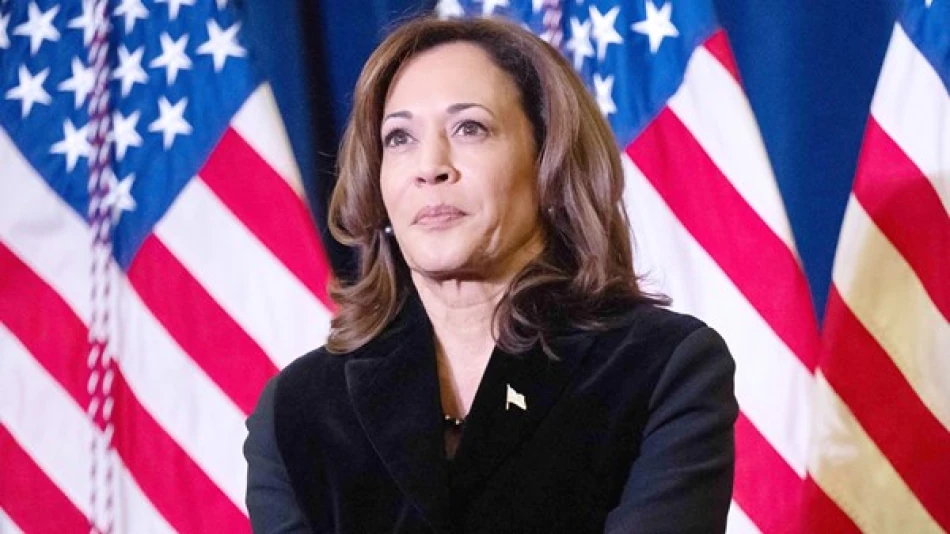
Kamala Harris Clarifies Stance on California Gubernatorial Run, Sparking Political Speculation
Kamala Harris Skips California Governor's Race, Signals Potential 2028 Presidential Bid
Former Vice President Kamala Harris announced Wednesday she will not seek California's governorship in 2026, a strategic decision that preserves her political capital for what appears to be a third presidential campaign in 2028. The move ends months of speculation about her post-2024 political future and suggests Harris remains focused on national rather than state-level ambitions.
A Calculated Political Retreat
In a statement from her office, Harris revealed the deliberative process behind her decision: "Over the past six months, I have spent time reflecting on this moment in our nation's history and how I can best continue fighting for the American people while advancing the values and ideals I hold dear."
Harris acknowledged her deep connection to California, calling it her "home" and expressing love for its people and distinctiveness. However, she concluded that the governor's mansion was not her intended path forward. "After deep consideration, I have decided that I will not run for governor in the 2026 elections," she stated.
The Strategic Calculus
Harris's decision reflects a broader pattern among ambitious politicians who view gubernatorial roles as potential dead-ends rather than stepping stones. Unlike senators who can maintain national profiles while serving, governors often become consumed by state-specific issues that can limit their federal appeal.
California's governorship, while prestigious, has historically proven challenging for presidential aspirants. The state's complex problems—from housing crises to wildfire management—can bog down executives in local controversies that don't translate well to national campaigns.
Presidential Ambitions Remain Alive
By declining the California race, Harris keeps her options open for 2028, when the presidential field will be wide open regardless of whether Trump wins or loses in 2024. This positioning mirrors similar moves by other national Democrats who have avoided state-level commitments to preserve their federal viability.
Harris's two previous presidential campaigns—a brief 2020 primary run that ended before Iowa and her 2024 general election loss to Trump—provide both experience and cautionary lessons. Her 2020 campaign struggled with messaging and organization, while her 2024 effort, though more polished, couldn't overcome broader electoral headwinds.
Learning from Past Defeats
The former senator's political journey reflects the modern reality of presidential politics, where multiple attempts are increasingly common. Joe Biden ran unsuccessfully in 1988 and 2008 before winning in 2020. Hillary Clinton lost in 2008 before securing the nomination in 2016. Even Trump's 2024 campaign represents a comeback attempt after his 2020 defeat.
Harris's decision to step back and reassess rather than immediately jumping into another race suggests a more methodical approach than her previous campaigns demonstrated. The six-month reflection period she described indicates serious strategic planning rather than reactive political maneuvering.
Market and Political Implications
For Democratic Party strategists and donors, Harris's decision creates both opportunities and uncertainties. Her withdrawal from the California race opens space for other Democratic figures to build gubernatorial credentials, potentially creating new national prospects for 2032 or beyond.
However, her implicit availability for 2028 may also freeze some Democratic planning, as major donors and endorsers wait to see her intentions before committing to other potential candidates. This dynamic could mirror the way Hillary Clinton's expected 2016 candidacy discouraged other Democratic hopefuls from entering that race early.
The 2028 Landscape
The 2028 presidential race will likely feature a crowded Democratic field, particularly if Republicans hold the White House after 2024. Harris would enter as a known quantity with significant name recognition, substantial fundraising networks, and experience managing national campaigns—advantages that proved crucial for Biden's 2020 success.
Her decision to remain on the national stage rather than governing California also means she'll continue engaging with federal issues and maintaining relationships with Democratic power brokers nationwide. This positioning strategy has proven effective for senators-turned-presidents but requires careful navigation to avoid appearing opportunistic or out of touch with state-level concerns.
Most Viewed News

 Layla Al Mansoori
Layla Al Mansoori






